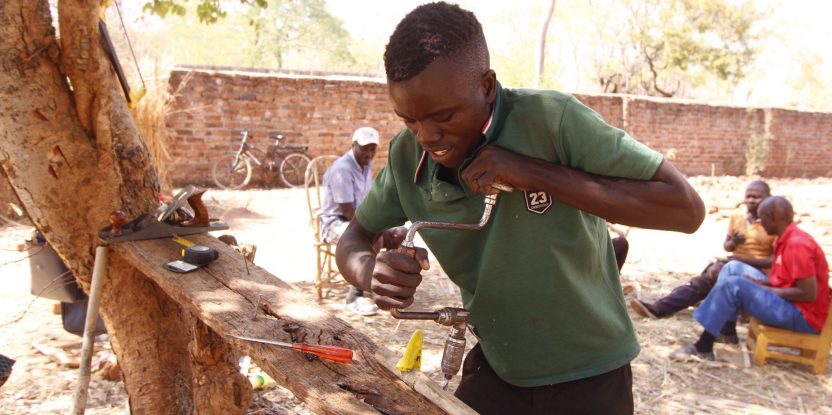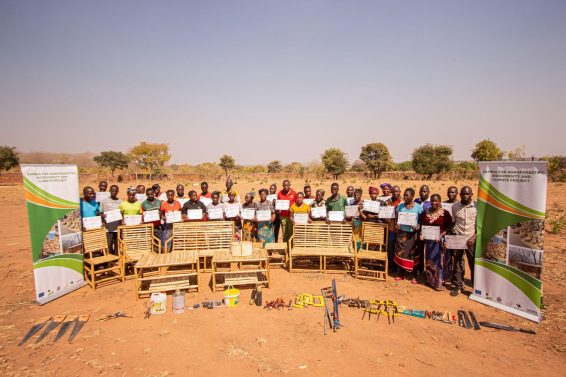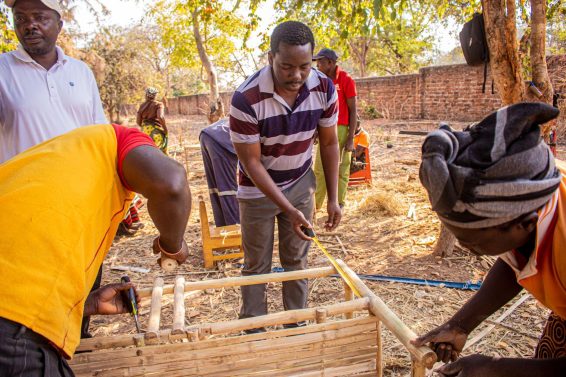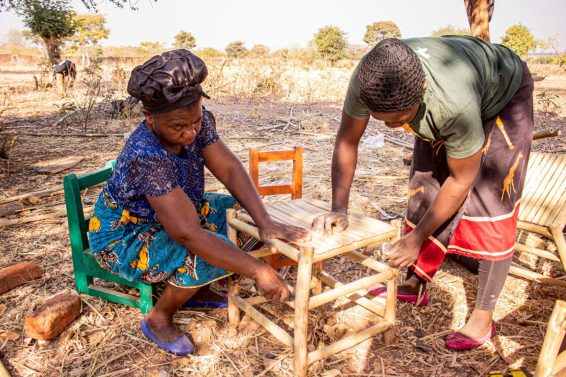
Clack. Tap. Clack. The rhythmic sound of hammers striking bamboo fills the air, breaking through cheerful conversations and bursts of laughter. On the ground, bamboo shavings blend with the red dust of the earth, and a sense of anticipation hangs in the humid air.
Twenty-six Vizimumba Information Center (VIC) members in Nyimba District of Eastern Province, Zambia, recently completed a transformative training program. This diverse group, split between men and women, including many youths, spent ten days learning the art of crafting furniture and other products from the indigenous Savannah Bamboo (Oxytenanthera abyssinica). The training, held under the Zambia for Agroforestry, Biodiversity, and Climate (Z4ABC) project, aimed to enhance bamboo craftsmanship in the community.
Guided by expert trainers from the International Network of Bamboo and Rattan (INBAR), participants mastered a wide range of techniques, including bending, straightening, processing materials, joinery, assembly, weaving, finishing, treatment, and preservation. They learned to produce high-quality bamboo furniture, including chairs, tables, stools and decorative woven baskets. The training, which ran from 8 to 19 July 2024, attracted both seasoned artisans and newcomers eager to expand their skills and create new opportunities for themselves.

Twenty-six participants from the Vizimumba Information Center engaged in 10 days of hands-on training, learning bamboo furniture and handicraft manufacturing techniques during the Z4ABC project training in Nyimba District, Eastern Province, Zambia. Photo by CIFOR-ICRAF
The hands-on approach to the training ensured that participants gained theoretical knowledge and practical skills essential for sustainable bamboo craftsmanship. Divided into small groups, they learnt how to select and prepare bamboo poles, cut and measure materials, and apply various joining techniques. The use of traditional bamboo nails and natural adhesives offered a cost-effective alternative to conventional fasteners, reflecting the programme’s emphasis on resourcefulness and sustainability.
“We have taught them how to make bamboo office chairs, tables, stools, and weaving techniques,” said Donald Khibuti, a consultant bamboo artisan from INBAR and leader of the training workshop. “Over the last 17 years, I have traveled in the region to provide guidance and enhance the skills of local artisans who lacked professional training.”
Participants also delved into bamboo’s environmental benefits, understanding its role in climate change mitigation and its potential to replace plastic products, thereby reducing pollution. The programme highlighted bamboo’s value as a renewable resource that supports sustainable development and fosters resilience against climate change.
“This workshop has given us new skills to create unique products for sale,” Mary Mbewe, one of the trainees, expressed with gratitude. Meanwhile, a young artisan, John Tembo, was optimistic about his future: “With this knowledge, we can save money by using bamboo nails and glue instead of fasteners.”

Bamboo artisan consultant Donald Khibuti from INBAR demonstrates advanced joinery techniques, guiding trainees through creating high-quality bamboo furniture. Photo by CIFOR-ICRAF

Women trainees proudly showcase their newly acquired bamboo production skills, symbolizing the breaking of traditional gender roles and promoting equality in the Vizimumba community in a traditionally male-dominated practice. Photo by CIFOR-ICRAF
The programme also introduced modern carpentry tools to complement traditional techniques, enabling artisans to produce more durable and eco-friendly products. This blend of innovation and tradition enriches the community’s craftsmanship and aligns with broader environmental goals, such as reducing deforestation and increasing carbon sequestration.
The training marks a significant step toward sustainable livelihood development in Vizimumba. The participants are now equipped to produce market-ready bamboo furniture and handicrafts, fostering job opportunities and self-employment within the province. Moreover, the new skills acquired will be shared with other community members, amplifying the training’s impact across the district.
Bamboo has long been a versatile resource for the people of Vizimumba Ward, and this training represents a renewed commitment to sustainably harnessing its potential. As the project continues to support the community, the aim is to ensure that bamboo remains a vital part of daily life, contributing to economic growth and environmental resilience.
Wellington Chazya, the pilot landscape coordinator for the project, highlighted the introduction of modern carpentry tools that complement traditional techniques to ensure the sustainable use of bamboo. “We want to enhance their skills to match modern production styles, support their artisan trade, and enhance their livelihoods.”
Chazya also mentioned previous training implemented by the project on establishing a bamboo nursery and planting bamboo within homesteads and field boundaries, which reduced the need for long-distance resource collection.
Bamboo plays a multi-functional role in Vizimumba Ward, supporting many livelihoods. The Z4ABC project collaborates with the community to ensure sustainable bamboo production, reducing pressure on forest resources and enhancing resilience to climate change.
This training marks a significant step toward sustainable livelihood development, empowering the Vizimumba community with valuable skills and knowledge in bamboo furniture and handicraft manufacturing.
About Z4ABC
The Z4ABC project is a four-year project targeted at contributing to climate-relevant, productive and sustainable transformation of agriculture and food systems. Additionally, it will provide scientific support for developing partnerships to support local solutions and address the Sustainable Development Goals (SDGs). It will be implemented in targeted areas in the Lower Zambezi – Luangwa – Nyika (ZLN) landscape to support the integrated transformation of selected agriculture, forestry, and wildlife-based value chains (VCs) in the ZLN corridor to become more sustainable, climate-resilient, and productive whilst supporting local livelihoods, food security, resilient food systems and protecting biodiversity. The project will contribute to Zambia’s Nationally Determined Contributions (NDC) to the 2015 Paris Agreement on Climate Change to cut emissions and adapt to climate impacts in the country.
We want you to share Forests News content, which is licensed under Creative Commons Attribution-NonCommercial-ShareAlike 4.0 International (CC BY-NC-SA 4.0). This means you are free to redistribute our material for non-commercial purposes. All we ask is that you give Forests News appropriate credit and link to the original Forests News content, indicate if changes were made, and distribute your contributions under the same Creative Commons license. You must notify Forests News if you repost, reprint or reuse our materials by contacting forestsnews@cifor-icraf.org.